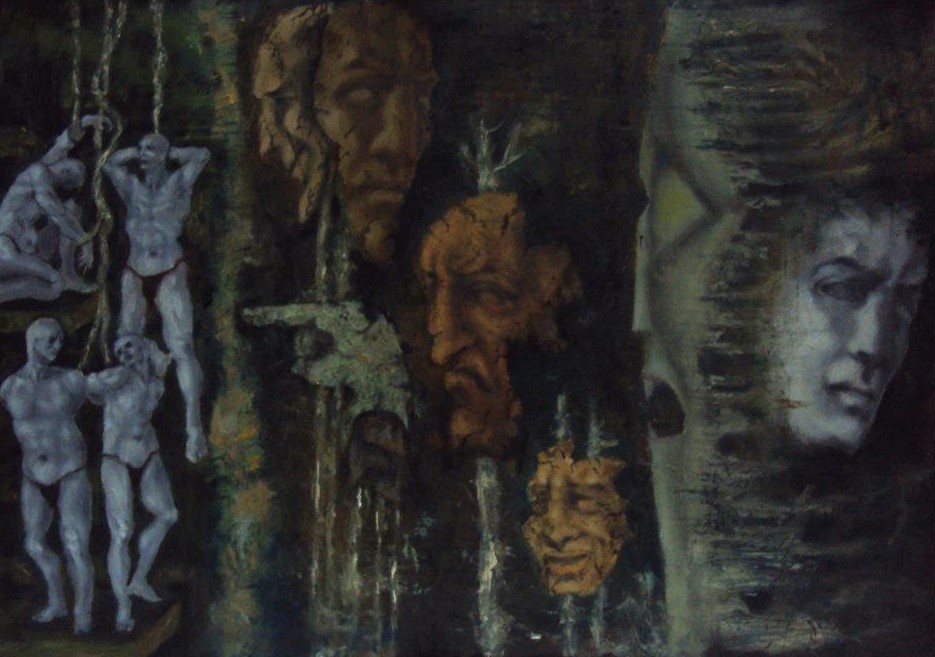Translated from the Bengali by Bishnupriya Chowdhuri

Artwork by Baibhab Bose.
3.
I have known her bare back and those wings. She is dusky and tall. Her ebony locks as if free of all worries, fall to the circular neckline of her maroon blouse. When the wind on the twelfth floor rustles her tussar silk, it seems as if the termites are getting burned too close to a waxed candle. The way she walks in crushing the blue carpet… On the wall, the freshly bathed women of Auguste Renoir. Water forever dripping down their buttocks and bosoms (This breast, where mortals come to grief)
She declares, “Today, I am going to leave before four. He’ll be waiting at the cemetery for me.” Or, crushing the blue carpet again she goes, “Listen, the siren at the dockyard! Ratnakar is about to leave. Any moment now! Please don’t you object.” Another day, ten in the morning, “Walking down the side of the lighthouse, I didn’t see another soul. Only the sea-jhau swaying and my scarf, blue in the breeze.” Covering her face with the palms of her hands, all of a sudden she almost breaks down, “Why? Why call me every day in the morning?” Keeping aside the warm cup of coffee, I try to console her, “You have recognized your own flower, your private scent. Who makes you so anxious every day?” I stub the cigarette—”Haven’t you started yet? Have you just started? What is your subject? Is it shower, service, or the ethereal purity of the rocks, is it love? Or is it some aquatic serpent or a desert storm? A navy hit by a torpedo? Then, on my lips and forehead… beads of sweat glisten.”
An asteroid crashed on the twelfth-floor terrace. Windowpanes and glasses shattered at the impact, but there was no dust or debris because of the sun film. Only the typist stopped working. And had a glass of water and ruminated about his childhood. He had just learned to play the top, and had to belt his shorts. The ladies of the neighboring house, their viridian skirts and pink corsets hung to dry on the roof… birds, sweeping across the sky, their excreta soiled that green, and the girls, exclaimed in unison… “Oh no… damn you silly bird!” and bit their lips in anger.
Now, he notices a spelling error. Thinking of the old tales about the deep rubber plantations in Malaysia, he runs the sleek edge of the eraser along the ivory page to rub off unwanted alphabets here and there. “Oh no, you silly bird.” As if he is trying the tolerance of the emotions of his typewriter.
There was no power cut that day. The shops had good business selling velvet curtains, shawls, and sleepy frocks. Nightly burflowers glowed in the sky.
4.
A photograph sent from space by an unmanned satellite. That’s the one you love. One where the earth appears like a bluish marble. As if you could press your thumb to the ground and roll the marble down some unknown slope of this earth. Or, you kick it hard, and it bounces much higher than the goalpost sending it to Pataliputra, Lebanon, Rio-di-Janeiro, and Jaisalmer all tumbling into each other. And at that point, none can be distinguished. Even your beauty too appears unknown. The place where there were those ivory marbles of Vatican, now has the honey gatherers and their shamans from the Sunderbans wading the mangrove. Tropical foliage blends with perennial snow…
All these, for the one who stands far. The one whose hands are unfettered. One who has kept out of the frame, at least for the moment. The bluish-ocher whirling sphere plays on his palms. This new logo of life—there, Pollock’s Piggery, there the corn field, Tuni’s read house, Laha’s paintbrush, the window where the mad woman sings, migratory autumnal swans descending on the warm waters of the lake, there the golden cloak of the assassin. See, there mingles laughter with tears, weddings, and separation. Love blends with unlove. You feel anxious, morose, and scared. Is it the moment before the apocalypse? Where is that hidden watch that keeps ticking toward the defining absolute time? Where are your water pitcher, hose pipe, and cotton plug? Where are your seatbelt and life-jacket?
Blazing, screaming gobs of molten metal, erupt from the crater across the sky. Stars explode. Wind blows like a desert storm. Roaring, it moves the lava to the seashore. The hissing white water, those bitten dead feathers… For centuries, lava slowly swallows a significant part of the rainforest. The helicopter sways precariously in the wild wind. The cameras roll and shake and metallic voices roll from the cockpit. “Hello, hello, can you hear us, George? Hello, George. Hello, Dipak da. Hello, dear master. Hello, Krishna Sarathi? Krishna—Can you hear us, Krishna?”—Maybe you too will not be heard, not ever, no more. You, the unknown beauty. Only a metallic voice from inside the telephone—“All the lines in this route are engaged, please try after some time!”
That day, we were tied to our seats, to our seatbelts and life-jackets. Those small boats with the children returning from the picnic gradually went down into the wild waters. And we watched them from our seats. Sun was going down too. Such was the tide.
5.
When the dawn breaks across the forest range of the mountains of Sierra Madre, the last shadows of the night totter at the bottom of the deep canyons. As if a goat kid is being chased by a golden tiger. A young man from the Tarahumara tribe watches from the top of the hill. He stands like the wind, stunned and speechless inside the pine forest. Far far below the deer has come for a drink at the raw, petite creek basking in the first-morning sunshine Not too far from there, on the other side of the slope is his shack. Down there in the valley, grows their corn. This massive kingdom that belongs to the Sun—the solar system—he often thinks that he could probably run, run without a breath’s pause to the edge of it all. He shall start, in silence.
The sudden cackling in the rocks and water startled him. He stepped out of the crevasse after waiting for a long time and found a woman, calmly poised in her woolen skirt. She was Marisha, a daughter of the trees. She crossed the water. Her bare, purple breasts and two babies, naked. They noticed the diamond sparkle of the fish in the water. Yet followed a swarm of bees. The woman and her children moved deep and deeper into the wilderness—the man called them with a shrill whistle.
The water shall flow. Crisp, unspoiled waves. The life that belongs to the glinting fishes and the lush green leaves, the life galloping from one mountain to another looking for honey and fruit to absorb the blessings of corn and sweet potatoes belonging to a warrior. Life took on hues as it connected with him, deeply free and a wanderer forever.
Islands as gigantic as a million yojans[1], oceans as wide as tens of million yojans… floating clouds and sunshine, joy and despair cascade from afar, beyond the polar mountains, from the infinite swaths of grasslands… They roll in, flood us and we go homeless, our rucksacks get rejuvenated, our sleeping bags, piton, canoe, high boots, ice-axe, our bangles, tarpaulin, tips of our nails, ears which have never been touched by that edge.
The child plays right where the water from the hydrant has the footpath divided horizontally and turned to rush toward the tramline. He plays under the shadows of deodar, she strikes a pebble with another. Dried leaves swoon to the autumn breeze. Shreds of her motherless days and nights are tucked into his tattered dress. Snot hangs from the nose and hairs remain unkempt. “Tututu tutu tara,” “Oh, you you’re the star,” he hums and casts a sudden startled glance at the road. He doesn’t care about the signals and crosses the road faster than a Maruti gypsy. From the other side, his voice shoots up, “Holo na pyaar mera,” “Oh no no, no love for me!”—such innocent lilt… as if he was the cursed son of a yogi or a fallen apsara. Perhaps, he did indeed appear from a golden glowing egg on the salty sea shores at the feet of the snow-capped mountain of Jambu Island.
After birth, within just the first five years, he had to learn on his own about the heart and soul of mass and gravitational pulls. The sparks of the day and the hues of the night. He has learned numerous ways of touch, heat, sounds, and the wind. Hurt and explosion. That which then transforms into songs and music—half utterances. Hydrant runs free and clamorous—”Oh you you you you the star, no no no no love for me….”
Note:
[1] Yojan is a unit of measuring distance in Indian mythology.
The above is the continuation of the first part of the piece that was published in The Antonym earlier in January. To read the first part, please click on the following link:
To read the third part, the final part, please click on the following link:
This Heart, The Sinking Depths…— Shankar Lahiri (Part Three)
Also, read eight short Italian poems by Annelisa Alleva, translated into English by Elena Buia Rutt, and published in The Antonym:
Follow The Antonym’s Facebook page and Instagram account for more content and exciting updates.



























0 Comments